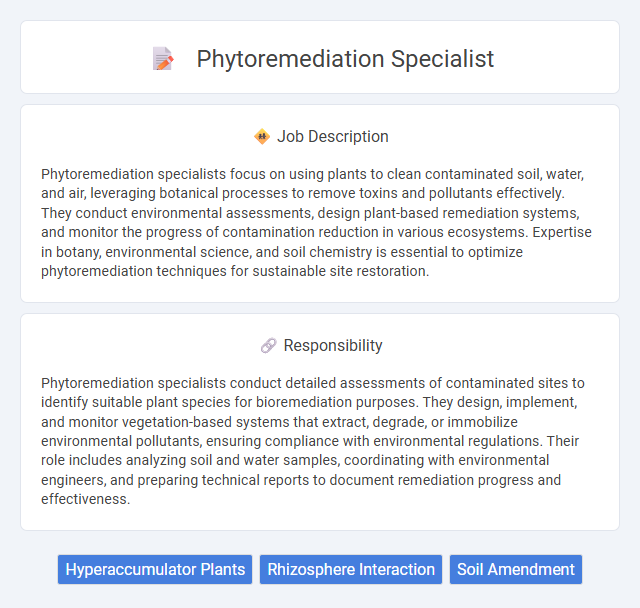
Phytoremediation specialists focus on using plants to clean contaminated soil, water, and air, leveraging botanical processes to remove toxins and pollutants effectively. They conduct environmental assessments, design plant-based remediation systems, and monitor the progress of contamination reduction in various ecosystems. Expertise in botany, environmental science, and soil chemistry is essential to optimize phytoremediation techniques for sustainable site restoration.
Individuals with strong analytical skills and a passion for environmental science are likely to excel as phytoremediation specialists. Those comfortable working outdoors and handling fieldwork under varying weather conditions may find this role suitable. Candidates with patience and attention to detail might have a higher probability of success due to the meticulous nature of monitoring plant-based remediation processes.
Qualification
Phytoremediation specialists typically hold a degree in environmental science, biology, or soil science with advanced knowledge in plant biology and contaminant uptake mechanisms. Proficiency in soil analysis, environmental regulations, and bioremediation technologies is essential for effective site assessment and remediation planning. Experience with GIS mapping, laboratory techniques, and project management enhances the ability to design and implement successful phytoremediation projects.
Responsibility
Phytoremediation specialists conduct detailed assessments of contaminated sites to identify suitable plant species for bioremediation purposes. They design, implement, and monitor vegetation-based systems that extract, degrade, or immobilize environmental pollutants, ensuring compliance with environmental regulations. Their role includes analyzing soil and water samples, coordinating with environmental engineers, and preparing technical reports to document remediation progress and effectiveness.
Benefit
Phytoremediation specialists likely provide significant environmental benefits by using plants to remove contaminants from soil, water, and air, reducing pollution naturally. Their work probably enhances ecosystem health and promotes sustainable land management practices. This approach may also lower remediation costs compared to traditional methods, making it an economically advantageous option.
Challenge
Phytoremediation specialists likely face challenges in effectively selecting and managing plant species capable of absorbing or degrading specific contaminants in diverse soil and water conditions. The complexity of local ecosystems and variability in pollutant types may complicate the development of tailored remediation strategies. Success in this field probably requires continuous adaptation to environmental changes and extensive interdisciplinary knowledge.
Career Advancement
Phytoremediation specialists play a crucial role in environmental restoration by using plants to remove contaminants from soil and water, creating growing demand for experts skilled in bioremediation techniques. Career advancement opportunities include progressing to project management, environmental consultancy roles, or research positions that drive innovation in sustainable remediation technologies. Expertise in genetic modification of plants and regulatory compliance enhances prospects for leadership roles in governmental and private sector environmental programs.
Key Terms
Hyperaccumulator Plants
Phytoremediation specialists focus on using hyperaccumulator plants to extract heavy metals and toxic substances from contaminated soils and water. These plants, such as Thlaspi caerulescens and Pteris vittata, can absorb high concentrations of pollutants, making them effective for environmental clean-up projects. Expertise in soil chemistry, plant physiology, and environmental regulations is essential for optimizing the remediation process and ensuring sustainable ecosystems.
Rhizosphere Interaction
Phytoremediation specialists analyze rhizosphere interactions to enhance the efficiency of contaminant degradation by plants and associated microorganisms. They focus on optimizing root exudate profiles and microbial colonization in the rhizosphere to improve the breakdown of pollutants in soil and groundwater. Expertise in soil chemistry, plant physiology, and microbial ecology is essential for developing sustainable bioremediation strategies.
Soil Amendment
Phytoremediation specialists focus on enhancing soil quality by using plants to remediate contaminated sites through natural processes like phytoextraction and phytostimulation. They analyze soil chemistry and microbial activity to optimize soil amendments, improving nutrient availability and contaminant breakdown. Their expertise is crucial for restoring soil health in industrial or agricultural areas affected by heavy metals, pesticides, or hydrocarbons.
 kuljobs.com
kuljobs.com